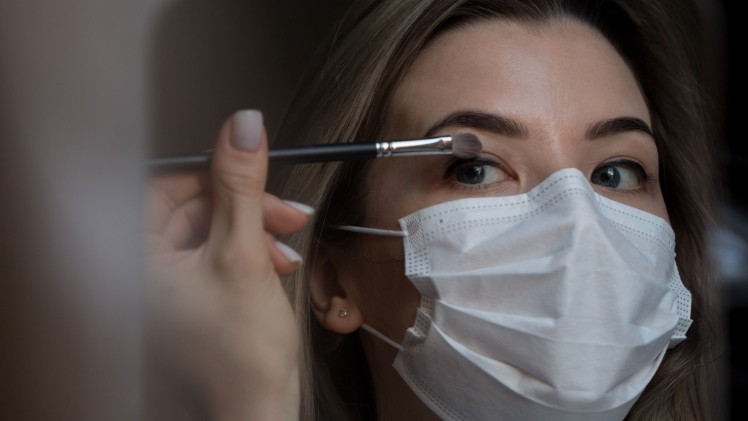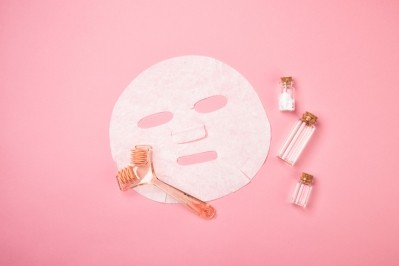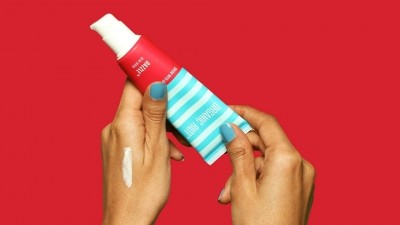Mask-friendly make-up: Covestro eyes potential for bio-based film former in APAC colour cosmetics market

Baycusan eco E 1001 is part of a new product line of polyurethane ingredients that aim to be at least 50% based on renewable raw materials to fulfil the requirements for natural origin materials in accordance with ISO standard 16128.
“There's a really strong trend for natural ingredients or ingredients that have less impact on the environment, but not many products meet the requirements of both sustainability and high-performance standards,” said Dr Jane Sum, head of cosmetics for Covestro.
With this product, the company is targeting the colour cosmetics market, said Sum.
“When we looked into the colour cosmetics market, there were not many good natural alternative ingredients. Our goal is to replace the natural ingredients that are currently being used but not working well, like shellac for instance,” said Sum.
Business development manager Lucy Liu said the company was seeing a lot of potential for the ingredient in the Asia Pacific region, in markets such as China, where the demand for natural products is high and shows no sign of slowing down.
However, product performance is key in such a demand cosmetics market. “We see a lot of brands that say they are natural but still have to use synthetics because there are no other natural choices available that would work,” she said.
No more mask smudges
The performance of film formers is especially important now as claims such as long-lasting and non-smudging are in high demand in the colour cosmetics market with consumers looking for make-up products that will not transfer onto their protective face masks.
“A distinct difference with other film formers in these times this would be a very good and strong advantage,” said Sum.
While the use of masks has affected make-up use, the company believes it will recover quickly in the APAC region.
“We are still seeing consumers wearing make-up, but just on the areas that are not covered by the mask so we are seeing an emphasis on eyeshadow, mascara and eyebrow products,” said Liu.
Colour cosmetics application tests with Baycusan eco E 1001 were tested in its APAC lab based in China, which is the firm’s technical expert centre for make-up and skin care.
For the experiments, the team used mascara as an example, as it is considered the most challenging to formulate, said Liu.
The goal was to determine if Baycusan eco E 1001 could hold up as a water-resistant, waterproof, anti-smudge and easy-to-remove product.
A formulation with Baycusan eco E 1001 was tested against two acrylate copolymers from the market and proved it was as competitive, and in some cases, more effective than the benchmarks.
The team also put it up against two mascaras from natural brands in the market, and it held up significantly better terms than both.
The company is currently developing a natural foundation formulation with Baycusan eco E 1001 to test its ability to hold up against situations like frequent mask-wearing.
“We are looking into advantages into other applications – definitely foundation because with more people wearing masks, foundation transfer is a big concern,” said Sum.
She added that the company has successfully developed non-transfer foundation formulations with its products from its Baycusan range.
“In the past, we have already shown that formulas with Baycusan have much better non-transfer resistance. We have done many tests such as one experiment where it showed foundations were less likely to transfer on phones.”
Additionally, the product has been proven on the market. “We are very confident that eco E 1001 can keep key properties such as water-resistance and anti-smudging to compete with benchmark polymers like acrylate,” said Liu.
![Greyon Cosmetics is aiming to extend its domestic business into local brick-and-mortar stores. [GettyImages]](/var/wrbm_gb_food_pharma/storage/images/_aliases/wrbm_medium/publications/cosmetics/cosmeticsdesign-asia.com/headlines/business-financial/india-s-greyon-targets-brick-and-mortar-expansion-nationwide-within-six-months/11963307-1-eng-GB/India-s-Greyon-targets-brick-and-mortar-expansion-nationwide-within-six-months.jpg)




![Indus Valley is working to corner 30% of India's online premium boxed hair colour market. [Indus Valley]](/var/wrbm_gb_food_pharma/storage/images/_aliases/wrbm_tiny/publications/cosmetics/cosmeticsdesign-asia.com/article/2024/07/26/indus-valley-aims-to-secure-30-of-india-s-online-premium-hair-colour-market-with-organic-offerings/17594932-5-eng-GB/Indus-Valley-aims-to-secure-30-of-India-s-online-premium-hair-colour-market-with-organic-offerings.jpg)
![[Getty Images]](/var/wrbm_gb_food_pharma/storage/images/_aliases/wrbm_tiny/publications/cosmetics/cosmeticsdesign-asia.com/china/china-focus-latest-developments-in-china-s-booming-beauty-market25/17606695-1-eng-GB/China-focus-Latest-developments-in-China-s-booming-beauty-market.jpg)
![Kosé has launched makeup brand Visée in Singapore as part of plans to reinforce its position in SEA. [Visée]](/var/wrbm_gb_food_pharma/storage/images/_aliases/wrbm_tiny/publications/cosmetics/cosmeticsdesign-asia.com/headlines/business-financial/visee-singapore-kose-aims-to-enhance-brand-visibility-in-sea-with-new-launch/17587264-1-eng-GB/Visee-Singapore-Kose-aims-to-enhance-brand-visibility-in-SEA-with-new-launch.jpg)
![ble C&C is set on reinforcing its competitiveness in China’s beauty market. [Missha]](/var/wrbm_gb_food_pharma/storage/images/_aliases/wrbm_tiny/publications/cosmetics/cosmeticsdesign-asia.com/headlines/business-financial/able-c-c-aims-to-strengthen-competitiveness-in-china-through-online-expansion-kol-collabs/17591626-1-eng-GB/Able-C-C-aims-to-strengthen-competitiveness-in-China-through-online-expansion-KOL-collabs.jpg)

![LG H&H genetic study says 23 genetic regions affect natural skin tone. [Getty Images]](/var/wrbm_gb_food_pharma/storage/images/_aliases/wrbm_tiny/publications/cosmetics/cosmeticsdesign-asia.com/article/2024/07/23/lg-h-h-discovery-of-genetic-skin-tone-factors-in-east-asians-potentially-key-to-skin-radiance-developments/17587210-1-eng-GB/LG-H-H-discovery-of-genetic-skin-tone-factors-in-East-Asians-potentially-key-to-skin-radiance-developments.jpg)

![DR.CI:LABO expects brand-supplier partnerships gain more public prominence as consumers interest in skin care grows online. [Dr.Ci:Labo]](/var/wrbm_gb_food_pharma/storage/images/_aliases/wrbm_tiny/publications/cosmetics/cosmeticsdesign-asia.com/article/2024/07/22/brand-supplier-partnerships-will-come-to-the-fore-amid-the-online-skin-care-landscape-dr.ci-labo/17576755-1-eng-GB/Brand-supplier-partnerships-will-come-to-the-fore-amid-the-online-skin-care-landscape-DR.CI-LABO.png)


